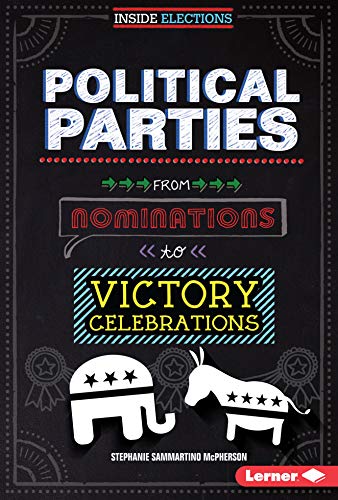-
Political Parties: From Nominations to Victory Celebrations
Stephanie Sammartino McPherson
Library Binding (Lerner Publications TM, Aug. 1, 2015)When an election is coming up, you usually expect a face-off between the two major US political parties―Democrats and Republicans. It's easy to forget that there are numerous minor parties―and even groups within a single party―that have different goals. Why do we need political parties? In modern elections, they are important in shaping candidates' positions on issues, determining who is nominated to run on a party ticket, and working behind the scenes to influence an election's outcome. Examine opposing viewpoints on some of the key issues surrounding political parties and consider for yourself the power they hold in the US election process.
-
Media: From News Coverage to Political Advertising
Sandy Donovan
Library Binding (Lerner Publications TM, Aug. 1, 2015)The frenzied news coverage during a political election is unstoppable. Political ads also bombard you from every source―websites, TV, radio, and print. Then there are the memes, links, and video clips that show up through social media. Are these just annoyances, or do media messages actually shape an election's outcome? News outlets, campaign staff, and even members of the public use many forms of media for different purposes: to explain candidates' platforms, to explore issues, to expose controversy, and more. Some messages are biased, while others try to be balanced. Examine opposing viewpoints on some of the key issues involving media's role and consider for yourself what power media has to influence the election process.
-
Special Interests: From Lobbyists to Campaign Funding
Sandy Donovan
Library Binding (Lerner Publications TM, Aug. 1, 2015)Special interest groups, lobbyists, political action committees, campaign finance reform―if people on the news are arguing about these subjects, it's probably an election year. Billions of dollars flow through special interest groups to fund campaigns at local, state, and national levels. Donors, corporations, and committees have the potential to greatly influence political candidates and election results, so the rules surrounding special interest groups and campaign funding should be of great concern to all citizens. Examine opposing viewpoints on some of the key issues and consider for yourself who has―and who should have―a say in the election process.
-
Elections
Kathleen Kopp, Christi Sorrell
Perfect Paperback (Shell Education, Feb. 1, 2012)Here's an excellent resource to enhance history and civics programs by introducing and exploring national, state, and local elections. Developed for Grades 6-12, Elections will expose students to primary sources and promote critical-thinking skills. Students will enjoy the opportunity to run a simulated election in the classroom and participate in interactive opportunities through discussions, and extension activities. Flexible, self-standing lessons allow students to study specific parts of the process, and differentiation ideas are provided within the lessons to challenge students at their individual thinking levels. The included Teacher Resource CD features primary sources and student reproducibles. This resource is aligned to the interdisciplinary themes from the Partnership for 21st Century Skills.
-
Political Parties: From Nominations to Victory Celebrations
Stephanie Sammartino McPherson
Paperback (Lerner Classroom, )What is the role of political parties in government elections? How do parties shape candidates' positions on issues and determine who is nominated to run on the party ticket? Readers will examine the roles of the two major US parties as well as the influence of third parties on election results. Pro/con charts help readers analyze opposing perspectives on controversial issues regarding political parties.
-
Special Interests: From Lobbyists to Campaign Funding
Sandra Donovan, Sandy Donovan
Paperback (Lerner Classroom, )Special interest groups, lobbyists, political action committees, campaign finance reformif people on the news are arguing about these subjects, it's probably an election year. Billions of dollars flow through special interest groups to fund campaigns at local, state, and national levels. Donors, corporations, and committees have the potential to greatly influence political candidates and election results, so the rules surrounding special interest groups and campaign funding should be of great concern to all citizens. Examine opposing viewpoints on some of the key issues and consider for yourself who hasand who should havea say in the election process.